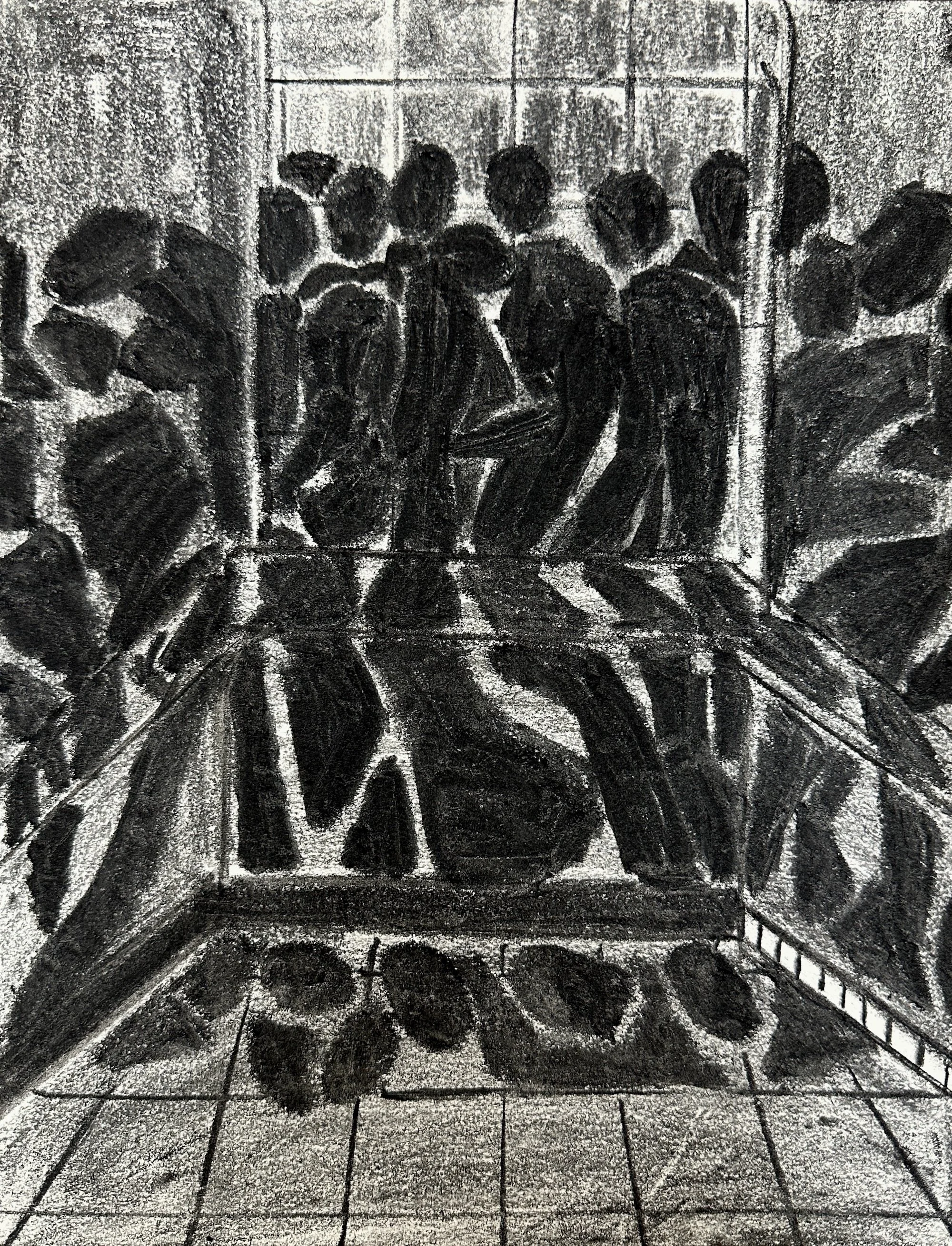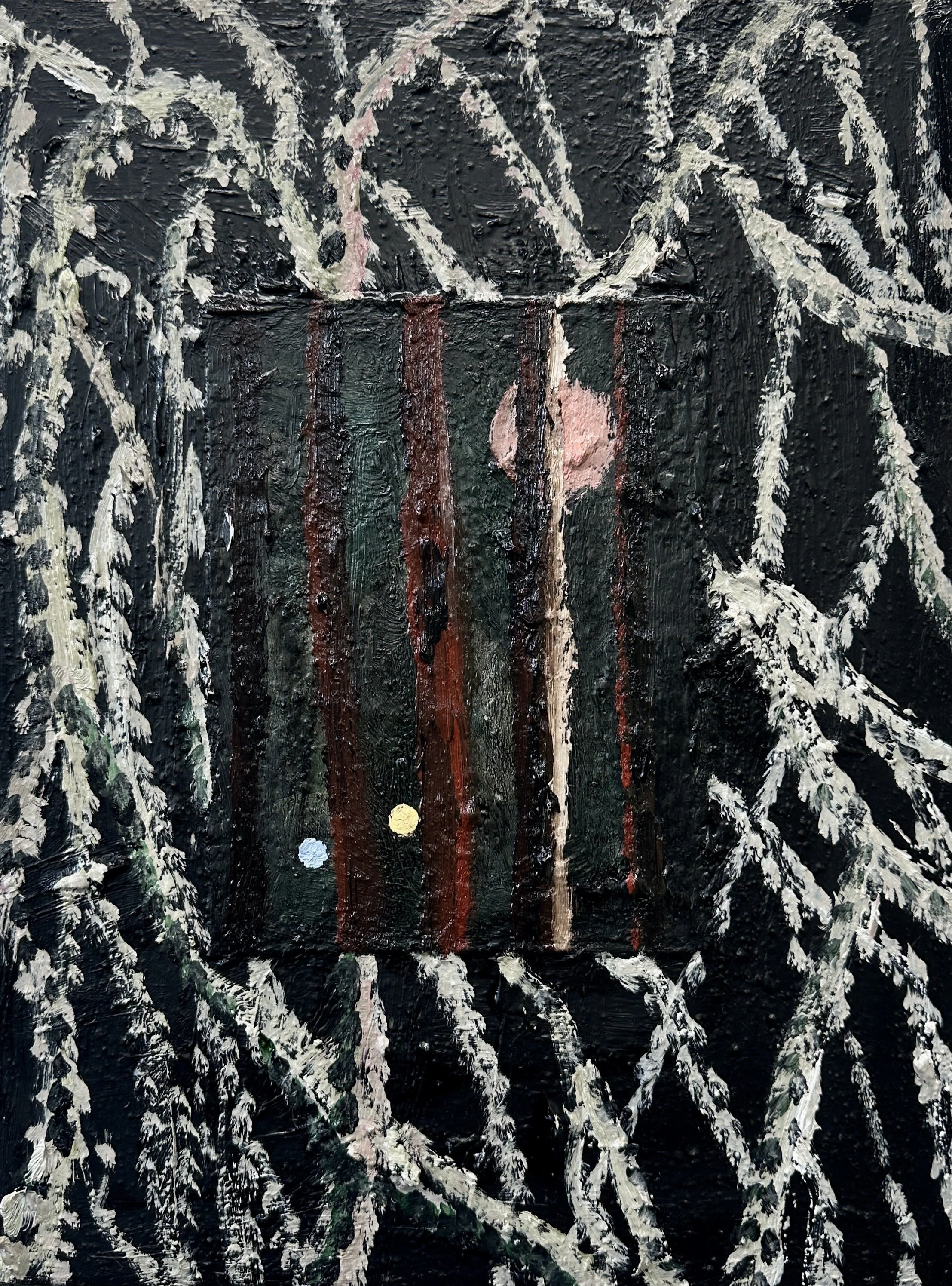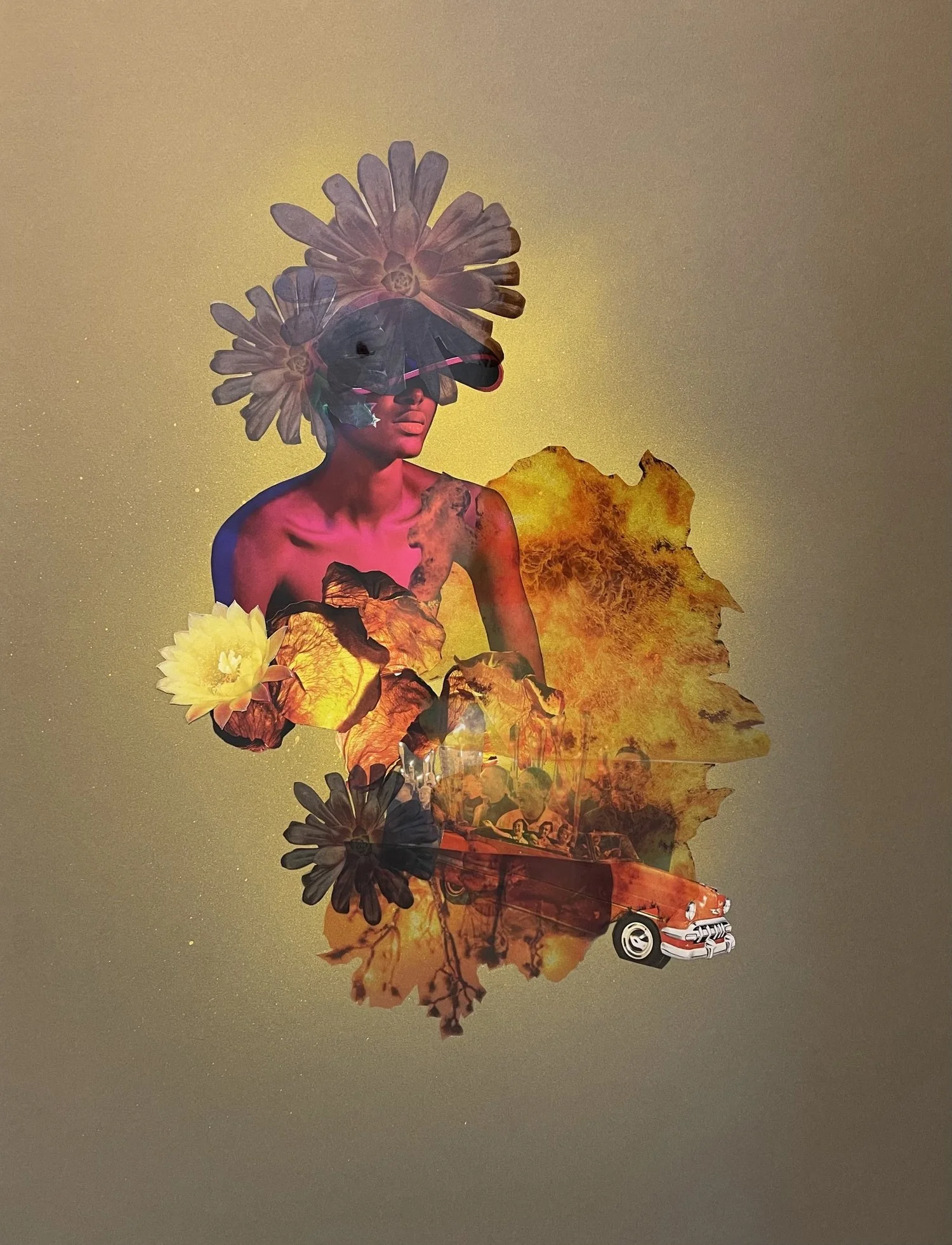Relearning OTHELLO: Director’s Cut
By C. Zhang
For the first time in the college’s history, a student production
of Shakespeare’s Othello was staged in University College Hall, Oxford.
The show ran every night from 9th to 12th November, 2024.
Andrew Seto, Bathhouse study (Shadows), 2025. Charcoal on paper, 36 x 26cm.
Image description: Geometrically stylized figures with their reflections, black and in sillouette, moving through a gridded room-like space sketched in greys on a white ground.
When the summer ended, the thought that you will not come to watch the show broke me. You have, I thought, forsaken what was ours. But in the wake of our final performance, shivering in an empty dining hall, I’m almost relieved. There isn’t really a safe time for me to see you these days, no way of looking at you that doesn’t pull my heart from my throat and spill it, vulnerable, out of my reach. You see, if I broke down in front of my cast and crew, that would be a professional embarrassment. Your absence might just have spared my puny student theater career.
Upstairs, the dingy bathroom doesn’t lock properly. The tap water only runs cold. I’ll join you guys in a moment, I tell everyone. I rub soap until my fingers are raw. Down the ghostly reach of the hallway, I hear my actors laughing. I love to listen to their laughter.
Bright colors, warm voices—and yet I stay in front of the mirror, talking to you.
The term cut, in media, refers to how a piece of art is edited. There’s a strange finality to the word: a neat line, a short snip-snip with the scissors. It’s sharp and decisive. A director’s cut, nowadays, is the version of a story that gives insight into the creator’s vision. As I ruminate on the facts and anecdotes omitted from Othello’s public performance, I remember that a cut, with time, becomes a scar. But I am disgusted by this alleged promise of closure. I do not want to forget. I am more content, I think, to retrace the scab. I write carefully, armed with a knife of memory, slipping the blade’s tip under the bandages to poke at the wound.
Less than a year ago, I decided to make a play. I have wanted to make Othello since I was a teenager. Granted, I was filled with delusions of grandeur: I thought I was going to make the greatest piece of art in the world. I blame you. Next to you, I felt invincible. When you smiled at me, I was certain that I could jump, just a little, and touch the sky.
What is Othello about? Power. Jealousy. Cunning. The ugly slash of domestic violence across a patchwork of military glory. It’s about a man who falls from grace, unable to trust the woman he loves. But I’ve never been one for love stories. To me, Othello is a story about friendship. Othello is about friends getting caught up in each other’s love lives, in each other’s sex lives; it’s about the blurring of boundaries between platonic and sexual relationships. It’s about vulnerability, exposure, self-loathing—as Iago says, so disgustedly, of Cassio: he hath a daily beauty in life which makes me ugly. To me, Othello captures the intimacy of being simultaneously enamored with and repulsed by your closest friends. Othello is about Iago, whose friendship comes laced with poison, a mixture of protectiveness and resentment, anxiety and affection.
I have, throughout adolescence, identified with Iago. I shared his curiosity for the private lives of his friends. I recognized his obsessive devotion to those he loves. I saw his softness, his deep insecurity that he would not be wanted if he isn’t needed. I held his loneliness close to my heart. Iago would understand, I think, the way I cannot help but invest in my friendships as if they were love affairs.
You’ve never been like me. You keep the tender parts of yourself so painfully restrained that it always surprises me when they break free.
But I felt Iago in you, too: the ugliness of his fear, his loathing. I don’t want to remember fighting with you. I don’t want to remember the last things you said. If I try, every flavor of memory returns with too much sharpness: the evening’s lamplight streaming past the windows, the car’s leather sticky beneath my legs. No sound, no scream, just tiny, black letters on a single iPhone screen, illuminated in the dark. Your rage, your terror, your babbling, incoherent pain.
I tried to speak to you, and you couldn’t understand me. I couldn’t understand you either. In the wake of the rift, I remembered Desdemona: I understand a fury in your words, but not the words. Back in their brighter days, Othello traded wisps and whorls of stories for Desdemona’s affection. She, in turn, won his love by understanding his words—so it felt like the end of the world when language abandoned them.
We traded words together, once. Between cups of tea and hand-sketched diagrams, you made the world make sense to me. In losing translation, I have lost something immeasurable.
Would I were satisfied, Othello says, when he is teased with the possibility of Desdemona’s betrayal. If I could make sense of this kaleidoscope, he tells himself, then surely its pain could be more easily borne. Here, Iago taunts him: ay may, but how? When I realized you weren’t coming back, I wanted to know how you rationalized it. How you justified this decision to yourself. Which—out of my myriad of speculations—was the real reason? I wanted to know why. If it was because you resented me for exposing a part of you that felt inherently private. Because you thought you’d behaved in ways that were embarrassing, undignified. Or because facing me again would mean acknowledging the part of yourself that is wounded, and capable of wounding, which is the one truth you cannot bear.
Ay may, but how? How satisfied, my lord?
There is no world where I am not furious, where I am not torn, where I am not viciously, breathlessly angry with you.
Because there is no good reason for you to leave me.
I refuse to justify this act. To exonerate it. No reason is valid. None could ever satisfy me. Not when it comes to you.
For all my abrasiveness, I am—in my own way—a coward. I use my academic passion as a shield. I’m a fool who has never learned how to express myself without the help of a well-loved text. Because, really: talking about Othello is the only way I can talk about you.
We had a language, once, that felt like safety. I am lost without it. Why didn’t I realize sooner that you needed help I cannot provide? Could I be blamed for wanting to protect you? You were my little home in the shape of a person. I would’ve gone down with its walls. I would’ve bared my teeth at hurricanes, trying to protect it.
I make do with what’s left of the debris. These days, I take the longer way back to the dorms. I keep an eye out when I duck my head under the gate, ready to turn the other way if I see you. I pass your bike on the racks and keep walking. Occasionally I look down, aching, at the complicated threads that run from the lifelines in my palm towards the invisible shape of you. I can dissever these threads of longing, should I choose to. But I am not sure if I will ever be ready to make the cut.
I have never made a play before, but I knew I loved watching words come alive. On opening night, amidst the adrenaline and the last-minute scramble, I savored a small moment of privacy as the lights dimmed. The show was out of my hands now. I felt the actors’ smallness, their fragility, as they danced atop the surface of tables. Our Iago reached out to grasp Othello’s knee, pulling closer—desperate, now—and I knew what he was thinking: if only you loved me a little bit more, I’d be fixed. Othello tipped his skull forward. Their foreheads touched. I held my breath. They had no idea how close they were to ruin.
What are we? A bunch of students setting up wooden flats, rigging fixtures of light in the corners. We reckon ourselves bigger than we ever were. But theater is its own strange power. It takes, and it gives. It drains you with its savage empathy. A slap echoed in a silent room. The lights went dark. A storm of Polaroids drifted down from the ceiling, swallowing Desdemona as she curled herself into a ball.
The photographs were memories. Somewhere in the dark they overwhelmed me, too. I remembered. I remembered how I howled and held myself as she did, chewing on the words you left me with. I had, like Desdemona, scrabbled through the torrent of memories and despaired: how could I have stopped this? Which moment could I have gone back and changed? Our Desdemona looked up. Surrounded by a room full of gaping faces, she shone with a boundless loneliness. She knew. She attested to my loss, and I alone witnessed her testimony.
When we took down the stage, I reveled in my smallness, my silliness: I had paraded an interpretation of my personal griefs for a roomful of people to see. None of them know, I thought. None of them know that this is, really, about me. I felt giddy, as if I had gotten away with a ruse. I had messed with the boundaries between privacy and publicity. I felt like Iago, teasing the exposure of something shamefully private.
She loved me for the dangers I have passed, and I loved her that she did pity them.
Othello loves stories. I do, too. I tell story after story about us, dressed in the disguises of well-loved scripts, to make up for how there is a world of stories—yours—that I will never get to know. It is here, night after night, that I say to myself: this only is the witchcraft I have used.
I am a different person, now.
I go to lectures. I try my best not to cry when I play the piano. I do silly things, like trading my favorite Haikyū binder with one of my actors for an envelope that’s frayed along the edges, because it has your name written on it. Sometimes, when it all feels ludicrous, I laugh at myself in the mirror. You liked me even when I was silly.
Nothing makes someone quite so self-absorbed as pain. Nothing else makes someone quite so petulant, so petty, or so childish. I know this, just as I am guilty of it. My sadness is of no greater magnitude than a stranger’s passing anguish. I sit here, parroting the words of bards. Like a clown, making drama out of my own sorrows as if my pain is bigger than the world it inhabits. It isn’t. It is small, and trivial. I hold onto it because it’s the only thing I have left from you.
I have so much love for you that has nowhere to go. It can only spill, like veins of paint, through the cracks in the crude art I attempt to make. It is outlandish and vain and self-indulgent, like all that I am. I miss you until I can’t breathe sometimes. It’s nothing new.
It’s almost midnight now. A few paper cups, sticky with wine, roll slowly away from my feet. The vaulted roofs make the dining hall seem empty. There’s confetti on the floors, stray Polaroids that no one has come to pick up. This is what you will remember on the day when my words finally reach you.
Andrew Seto, Circuit 121 (Speak), 2023-25. )il on canvas with collaged canvas, 40 x 30cm.
Image description: White painted branches in a circuit-like design against a dark ground with a central rectangular, window-like inset: the abstract inset image suggests a pinkish full moon behind vertical tree trunks, much like a moonlit forest painted in dark green and sienna.
C. Zhang reads English at University College, Oxford. She desires, above all, to keep loving what she loves.
*
Andrew Seto (b. 1966, Edinburgh) is a British artist of Cantonese heritage based in London. He plays with themes of the queer poetic gaze and an imperfect sublime, giving generous doses of bathos and materiality. His work has been exhibited in the UK, France, Germany, China, and the US, and has been selected for juried shows such as the John Moores Painting Prize, the Jerwood Painting Prize, and the Whitechapel Open. His recent solo shows include L'art dans les chapelles, Brittany (2022) and Desire Lines at Studio1.1 London (2023). Forthcoming shows in Paris for Moments Artistiques and Au Passage (2026).




‘It was early January, and the snow had come down that day like an epiphany.’ – an essay by Max J. Nam.